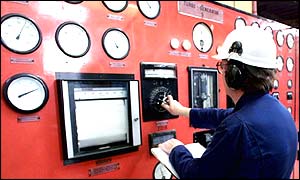| You are in: Health | |||||||||||||||||||||||||||||||||||||||||||||||||||||||||||||||||||||||||||||||||||||||||||||||||||||||||||||||||||||||||||||||||||||||||||||||||||||||||
|
Tuesday, 11 June, 2002, 10:55 GMT 11:55 UK
Analysis: Effects of a dirty bomb

Nuclear power station: Security is tight
BBC News Online assesses the potential health effects if a 'dirty bomb' was deployed by terrorists.
What is a 'dirty bomb'? A dirty bomb is made of radioactive material attached to conventional explosives. If the weapon explodes, there is a risk of both direct casualties and illness caused by exposure to radioactive material.
Potential sources of material used to make a dirty bomb include radioactive waste from industry and medicine:
According to the US Nuclear Regulatory Commission, an average of 200 radiation sources used in medicine or industry are stolen, lost or abandoned in America each year. What are the potential health hazards? Anyone exposed to extremely high levels of radioactivity is likely to suffer radiation sickness. The radiation destroys cells it comes into contact with. It is most dangerous when it enters the body by being swallowed, breathed in or entering through an open wound. At lower levels, radiation is linked with cancer. According to Mark Gwozdecky of the International Atomic Energy Agency in Vienna, Austria, producing a lethal radioactive weapon is not as easy as some have suggested. He told BBC News Online: "These are not weapons of mass destruction, they are potentially a weapon of mass disruption. "There's limited lethality," he added. "You would have to swallow and breathe in the material before you could become a casualty." What would happen if a dirty bomb did explode? It is impossible to predict what might happen if a dirty bomb exploded in a city such as London. It would depend on the amount of radioactive material in the bomb, the type of radioactive substance, and how far it was dispersed. To design something that would disperse radioactivity over a wide area would need sophisticated weapons expertise, said Mr Gwozdecky. He told BBC News Online: "It's hard to imagine any kind of dirty bomb producing the kinds of mass casualties that we saw on September 11." How would patients be treated if a dirty bomb exploded? Plans are in place in the UK, should a radioactive emergency arise. Casualties would be taken to reception hospitals supplied with decontamination equipment, protective clothing and specialist monitoring devices.
The treatment would depend on the type of radioactive material they had been exposed to. Some types of radioactive material - such as those used in nuclear power stations - are highly poisonous if ingested. Others are less dangerous and would disappear quickly from the body. Patients would be given something to try to flush out the radioactivity. This could be anything from tablets to fruit and vegetables, depending on the type of radiation poisoning. Other treatment would focus on trying to repair damage to cells and body tissues. It is sometimes possible for people to survive otherwise lethal doses of radiation if bone marrow transplants are performed. Security Roland Blackwell, Professor of Medical Physics at University College London Hospitals told BBC News Online: "All the hospitals have been checked for security. "We have procedures in place should anything happen." He said that in order for a dirty bomb to be "genuinely dangerous and effective as opposed to psychologically", terrorists would have to get hold of a lot of radioactive material. "It is difficult to handle and they would probably kill themselves doing it," he added.
|
See also:
10 Jun 02 | Americas
11 Jun 02 | Americas
10 Jun 02 | Americas
Internet links:
The BBC is not responsible for the content of external internet sites Top Health stories now:
Links to more Health stories are at the foot of the page.
|
|||||||||||||||||||||||||||||||||||||||||||||||||||||||||||||||||||||||||||||||||||||||||||||||||||||||||||||||||||||||||||||||||||||||||||||||||||||||
|
Links to more Health stories |
 |
||
| ----------------------------------------------------------------------------------
To BBC Sport>> | To BBC Weather>> | To BBC World Service>> ---------------------------------------------------------------------------------- © MMIII | News Sources | Privacy |